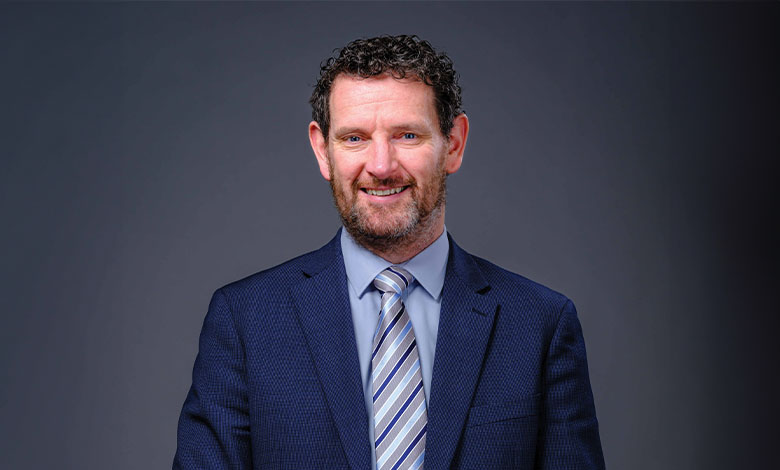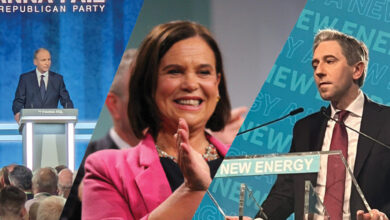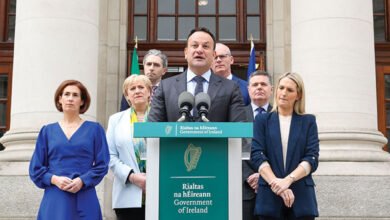Colm Markey MEP: Ports key to offshore wind ambition

Ireland’s ambition to become a superpower in offshore wind energy is adrift in a sea of regulatory constraints, writes Fine Gael Midlands–North-West MEP Colm Markey.
Despite boasting a maritime area seven times the size of its landmass and some of the highest wind speeds in Europe, the nation faces the risk of missing its target to deliver five gigawatts (GW) of offshore wind by 2030. The challenges are multifaceted, ranging from complex planning procedures to grid capacity limitations and skills shortages.
However, one critical aspect often overlooked is the readiness of port infrastructure. The development of offshore wind energy hinges significantly on the accessibility and efficiency of port facilities. Ports serve as crucial hubs for construction, operation, and maintenance activities, as well as for converting offshore wind energy to green hydrogen energy.
In January 2024, the European Parliament adopted an ‘own initiative report’ on building a comprehensive European port strategy which emphasises the vital role ports play in the energy transition. It calls for more investment in ports, highlights the need forr fast-track permitting of port expansions, and stresses the importance of a skilled workforce along with adequate public and private funding.
Another upcoming vote in the European Parliament will see energy ports included in the EU’s transport network (TEN-T). This shift, which I have long pushed for as a member of the Parliament’s Transport Committee (TRAN), also acknowledges ports’ contribution to the energy transition and enables them to apply for substantial funding under the Connecting Europe Facility. It is a pivotal step towards aligning port infrastructure with Europe’s renewable energy goals.
While Europe progresses, Ireland’s pace remains sluggish. Currently, Belfast is the sole port capable of supporting an offshore wind farm on the island of Ireland. However, promising developments are underway. Bremore Port, situated off the Dublin/Meath coast, is poised to become a new deep-water port, with a focus on the offshore wind sector. Similarly, Galway Port, now with TEN-T status, is planning a significant expansion to facilitate offshore wind development. The latter, however, is still waiting for a decision from An Bord Pleanála, 10 years after its plan was submitted.
I recently hosted a delegation from Bremore Port and Ronan Group in the European Parliament where they updated policymakers about their plans. Bremore Port Director Joseph Hiney underscored the message that ports are facilitators of economic growth. Their presence not only stimulates economic activity but also fosters innovation and collaboration, enhancing regional competitiveness. It is a win-win for both the environment and the economy. Investing in our ports means reduced emissions, job creation, and cheaper energy bills for consumers.
While I welcome the Government’s recently-published Powering Prosperity: Offshore Wind Industrial Strategy, it is crucial that action matches aspiration. The document outlines 40 measures to be implemented over the next two years, anchored on four core pillars: offshore wind supply chains, research, development and innovation, balanced regional economic development and future demand and end uses.
Initial steps have been taken, including the first Maritime Area Plans, the first successful offshore wind auction, and the establishment of the Maritime Area Regulatory Authority. However, despite this progress, a significant obstacle remains unaddressed.
The inefficiency of An Bord Pleanála poses a challenge. Certainty is vital for effective planning, yet prevailing uncertainty surrounding outcomes and the risk of judicial review erodes confidence in the process. Streamlining regulatory procedures is imperative to move Ireland’s offshore wind sector forward.
Reform should not come at the expense of local communities; rather, it should benefit them. Community and stakeholder engagement are essential for success. I have long advocated for any Community Benefit Fund linked to a project to be managed locally, not centralised. Local coastal and marine communities will play a significant role in facilitating these developments and should reap the benefits.
In conclusion, it is imperative that we remind ourselves of the importance of taking on these challenges head-on. With the EU’s commitment under the European Green Deal to cut emissions by 55 per cent by 2030 and achieve climate neutrality by 2050, the urgency of embracing offshore wind cannot be overstated. By investing in our ports and addressing regulatory and planning inefficiencies, we can not only make our country energy secure, but also stimulate economic growth, potentially generating billions for the economy.
We stand on the cusp of a renewable energy revolution and the time for action is now. The benefits are clear: reduced carbon emissions, energy security, and economic prosperity, all anchored by the development of our ports. Let us seize this opportunity and propel Ireland towards a sustainable future powered by offshore wind.
Colm Markey MEPColm Markey MEP is a Fine Gael and European People’s Party Member of the European Parliament for Midlands–North-West and sits on the Committee on Transport and Tourism (TRAN). |





